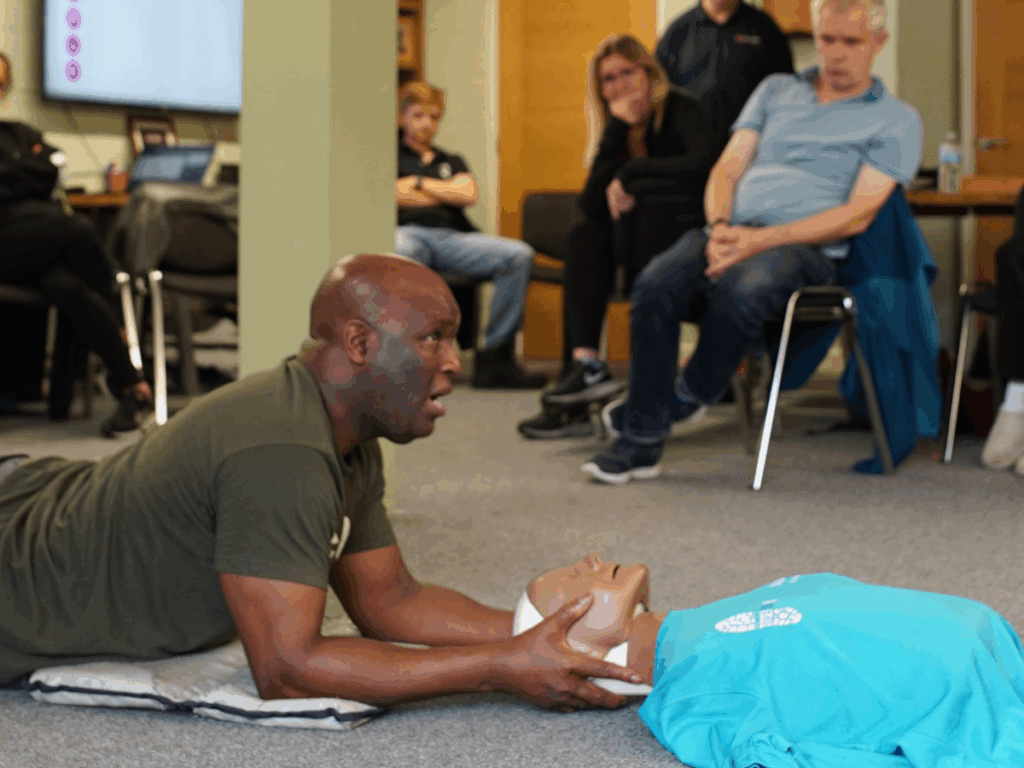Imagine this: you’re walking through the office, and someone suddenly collapses. Your instinct is to help, but what if you’ve never had formal first aid training? Many people hesitate in these moments, worried about doing the wrong thing or even facing legal consequences. So, what does the law say, and what should you do?
Is it legal to give first aid without training?
Yes. In the UK, there’s no legal requirement for formal training before you assist someone in an emergency. The law encourages people to help where they can. The Social Action, Responsibility and Heroism Act 2015, often called the Good Samaritan law, offers protection to those who act reasonably and in good faith during emergencies. In short, if you’re trying to help, you’re unlikely to face legal trouble.
That said, you should always act within your ability. Basic actions like calling 999, reassuring the casualty, or applying pressure to a bleeding wound can make a huge difference. But complex procedures? Leave those to trained professionals.
In the UK, there’s no legal obligation for members of the public to provide first aid. That means if you witness an accident or a medical emergency, you’re not legally required to step in. However, employers do have specific duties under the Health and Safety (First-Aid) Regulations 1981 to make sure their workplace has adequate first aid arrangements, such as trained first aiders, first aid kits, and procedures in place.
For individuals, the law’s position is simple: you’re free to help, but you don’t have to. If you choose to act, you’re expected to do so reasonably and within your level of knowledge.
What can you do in an emergency without first aid training?
If you’re not trained, focus on simple, safe steps:
- Call emergency services immediately (999 or 112).
- Check the scene is safe before approaching.
- Offer reassurance, your calm presence can help.
- Apply pressure to bleeding wounds if safe to do so.
- Start chest compressions for CPR if the person isn’t breathing normally. Skip rescue breaths unless you’ve been trained.
What should you avoid?
Some actions can cause harm if done incorrectly. Without training, avoid:
- Performing rescue breaths or advanced CPR techniques.
- Using tourniquets or complex wound dressings.
- Moving someone with a suspected spinal injury.
- Giving food, drink, or medication, especially in cases of poisoning or unconsciousness.
If in doubt, don’t guess. Stick to what you know and wait for professional help.
Understanding the Social Action, Responsibility and Heroism Act 2015
Many people worry about getting into legal trouble if something goes wrong while they’re trying to help. The Social Action, Responsibility and Heroism (SARAH) Act 2015 was introduced to ease those fears.
The Act protects “good Samaritans” (ordinary people who step forward in an emergency) by asking courts to consider three key points if legal action is ever brought against them:
- Social action – Were you trying to help someone or contribute positively to society?
- Responsibility – Were you acting responsibly and sensibly given the situation?
- Heroism – Were you acting heroically by intervening in an emergency to help someone in danger?
In other words, if you act in good faith, without recklessness, and with the intention of helping, the law is on your side. The Act doesn’t provide blanket immunity, but it does offer legal reassurance that people who step up to help others won’t be unfairly punished for doing so.
Why training matters
While you can help without training, formal first aid education gives you confidence and competence. It teaches you how to act quickly and correctly under pressure. You’ll learn life-saving skills like CPR, managing choking, and treating burns in a safe, controlled environment. Isn’t that worth a few hours of your time?
Book Your First Aid Training with Ouch
Thinking about first aid training for your team? We’d love to help.
At Ouch Learning and Development, we don’t just deliver courses, we build confidence. Our trainers bring real-world experience, practical know-how, and a friendly approach to every session. Whether you’re booking for a group or refreshing your own skills, we’ll make sure the training fits your needs and your workplace.
👉 Why not get in touch and see how we can support you? Click here to contact us.
